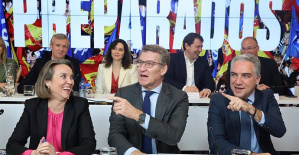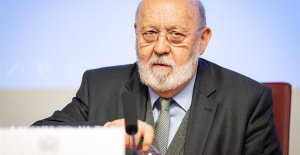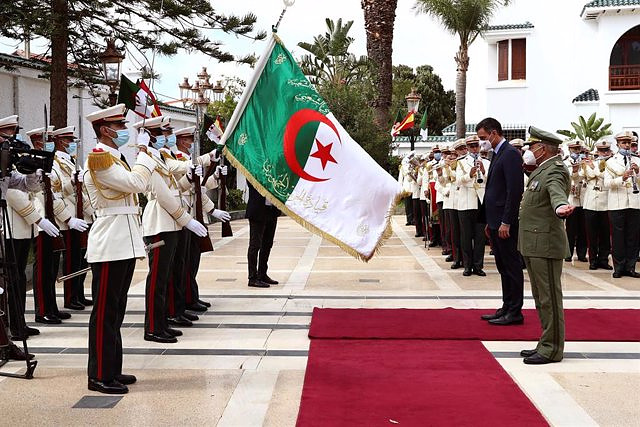Algiers is preparing to send a new ambassador to Madrid after withdrawing him due to support for the Moroccan autonomy plan for the Sahara
MADRID, 4 Nov. (EUROPA PRESS) -
Algeria has finally decided to turn the page on the open diplomatic crisis with Spain as a result of the Spanish Government's support for the Moroccan autonomy plan for the Sahara in March 2022, a gesture that served to close the crisis with Morocco and the opening of a new stage in the relationship that has not yet ended, in the absence of the expected opening of customs in Ceuta and Melilla.
The Algerian Government has decided to send a new ambassador to Madrid, after automatically calling the previous one for consultations after learning of the letter from the President of the Government, Pedro Sánchez, to Mohamed VI in which he maintained that the Moroccan autonomy plan is "the basis more serious, credible and realistic" to resolve the Sahara conflict, according to 'El Confidencial' and has also been confirmed by the Algerian press.
Thus, the Spanish Government should soon accept the agreement for the new Algerian ambassador so that he can assume his position in Madrid. With this, a crisis could be considered overcome that, in addition to the withdrawal of the ambassador, led Algiers to suspend the Treaty of Friendship three months later and to the practically total freeze of trade between the two countries.
As a result, exports to the Maghreb country have been reduced to a minimum in the intervening time, with the consequent impact on the income of businessmen with interests in Algeria. On the other hand, Algeria has guaranteed the supply of gas to Spain at all times, something that the Government has been responsible for highlighting throughout this time.
Algeria, starting with its president, Abdelmayid Tebune, has maintained a very critical tone towards Spain, in particular against Sánchez but also against the Minister of Foreign Affairs, José Manuel Albares. In turn, the Spanish Government has tried all this time to temporize the criticism and reiterate its desire to have "the best relations" with the country, appealing to discretion in its efforts to redirect the relationship.
Those efforts would now have borne fruit. As explained to the media 'Tout sur l'Algérie' by the president of the Algerian-Spanish Circle of Commerce and Industry (CCIAE), Djamel Eddin Buabdalá, "there were contacts between the two parties in September in New York on the margins of the General Assembly of the UN", a point that the Spanish Foreign Ministry does not confirm, nor does it comment on the eventual arrival of the new ambassador.
According to the aforementioned businessman, then "there was an agreement on a progressive return of relations between Algeria and Spain." According to Buabdalá, the speech given by Sánchez before the General Assembly contributed to this, in which he did not mention the Moroccan autonomy plan and limited himself to supporting "a mutually acceptable political solution within the framework of the United Nations charter and in Security Council resolutions".
The position maintained by the Government in recent weeks following the Hamas terrorist attack against Israel on October 7 and the subsequent Israeli response by bombing the Gaza Strip has also helped.
Sánchez has roundly condemned the action of Hamas and recognized Israel's right to defend itself, always within what is contemplated by International Humanitarian Law, but he has also made it clear that the only way to resolve this situation is through the materialization of the two-way solution. states and the recognition of the Palestinian State. The Palestinian cause is a key issue in Algerian internal politics.
However, we must not forget the moment in which the expected thaw with Algiers occurs, on the eve of the foreseeable investiture for a second term. The holding of general elections in Spain, brought forward to July 23, had generated the feeling that Algeria was not going to take any steps towards reconciliation while awaiting the result of the polls, perhaps in the hope that the eventual arrival of the PP to Moncloa would mean a step backwards in terms of the position regarding the Sahara.
Once it was confirmed that Sánchez will continue as president for now, Algeria would have opted for a more pragmatic position and sent its ambassador back to Madrid. In the absence of an official announcement and explanation of this decision, it remains to be seen if the diplomatic gesture also translates into reconciliation in the commercial section as well.
In this sense, some steps have already begun to be taken, according to Buabdalá. The president of the CCIAE frames there the resumption of Air Algérie flights, the state airline, to Palma de Mallorca, as well as the increase in the frequency of Iberia flights between Madrid and Algiers and the recovery of the Vueling flight between Barcelona and Oran.
Meanwhile, the electoral advance also seems to have had an impact on the new stage in the relationship that Sánchez's letter opened and that was sealed with the meeting he held on April 7, 2022 with the Alawite king. The High Level Meeting (RAN) last February in Rabat served to reaffirm the will of the two governments to continue advancing on the 'roadmap' that they have set.
A 'roadmap' that the Government insists is being a success, supported above all by good data on the commercial level, with a considerable increase in numbers, and also on the immigration level, since arrivals from the coasts Moroccans have not experienced the drastic increase that has been recorded on other routes to Europe, such as Italy or Greece.
However, there are still some important aspects of the agreement to materialize. The most notable, due to the meaning it has, is the reopening of the Melilla customs office and the creation of a new one in Ceuta. To date there have only been three test expeditions, the first on the eve of the RAN at the end of January, the second on the 24th of that month, and the last on May 26, on the eve of the regional and municipal elections.
Since then, there has been no news and although in the interview given to Europa Press at the end of August Albares did not want to confirm whether the electoral advance and the uncertainty generated by the result regarding the formation of the new Government, the truth is that everything indicates because the agreed calendar, which has never been made public, has been temporarily put on hold.
There is also no evidence of progress in another chapter that is of particular interest to the Canary Islands: the delimitation of the territorial waters of the Atlantic coast. Both governments agreed to reactivate the existing working group that had not met for fifteen years. Since then, there have been at least two meetings, but no concrete results have emerged.
In addition, the new visit to Rabat to which Mohamed VI invited Sánchez in the telephone conversation they had before the RAN to justify not receiving him during his stay in the Moroccan capital is pending. The Alawite monarch was not in the country at that time but invited the President of the Government to "carry out an official visit soon" that has not yet materialized. The imminent investiture could pave the way for this to occur soon.

 Exploring Cardano: Inner Workings and Advantages of this Cryptocurrency
Exploring Cardano: Inner Workings and Advantages of this Cryptocurrency Seville.- Economy.- Innova.- STSA inaugurates its new painting and sealing hangar in San Pablo, for 18 million
Seville.- Economy.- Innova.- STSA inaugurates its new painting and sealing hangar in San Pablo, for 18 million Innova.- More than 300 volunteers join the Andalucía Compromiso Digital network in one month to facilitate access to ICT
Innova.- More than 300 volunteers join the Andalucía Compromiso Digital network in one month to facilitate access to ICT Innova.-AMP.- Ayesa acquires 51% of Sadiel, which will create new technological engineering products and expand markets
Innova.-AMP.- Ayesa acquires 51% of Sadiel, which will create new technological engineering products and expand markets The PP sees the concentration of support for Sánchez in Ferraz as a "failure" and believes that it "complicates" the story of its continuity
The PP sees the concentration of support for Sánchez in Ferraz as a "failure" and believes that it "complicates" the story of its continuity Marc Márquez returns to pole in Jerez
Marc Márquez returns to pole in Jerez The CIS carries out a quick survey on Sánchez's letter to measure the reaction of citizens
The CIS carries out a quick survey on Sánchez's letter to measure the reaction of citizens 12M.- Puigdemont to Sánchez and Illa: "This is not about the future of the PSOE! What have you believed?"
12M.- Puigdemont to Sánchez and Illa: "This is not about the future of the PSOE! What have you believed?" How Blockchain in being used to shape the future
How Blockchain in being used to shape the future Not just BTC and ETH: Here Are Some More Interesting Coins Worth Focusing on
Not just BTC and ETH: Here Are Some More Interesting Coins Worth Focusing on UPV students build a prototype of a wooden house to move to Equatorial Guinea
UPV students build a prototype of a wooden house to move to Equatorial Guinea The UA opens the call for the Impulso 2024 Awards for the best innovative business initiatives
The UA opens the call for the Impulso 2024 Awards for the best innovative business initiatives ALI, virtual assistant from Alicante, internationally recognized by the OECD
ALI, virtual assistant from Alicante, internationally recognized by the OECD Retrópolis brings the golden age of video games and computing to the UPV
Retrópolis brings the golden age of video games and computing to the UPV A million people demonstrate in France against Macron's pension reform
A million people demonstrate in France against Macron's pension reform Russia launches several missiles against "critical infrastructure" in the city of Zaporizhia
Russia launches several missiles against "critical infrastructure" in the city of Zaporizhia A "procession" remembers the dead of the Calabria shipwreck as bodies continue to wash up on the shore
A "procession" remembers the dead of the Calabria shipwreck as bodies continue to wash up on the shore Prison sentences handed down for three prominent Hong Kong pro-democracy activists
Prison sentences handed down for three prominent Hong Kong pro-democracy activists ETH continues to leave trading platforms, Ethereum balance on exchanges lowest in 3 years
ETH continues to leave trading platforms, Ethereum balance on exchanges lowest in 3 years Investors invest $450 million in Consensys, Ethereum incubator now valued at $7 billion
Investors invest $450 million in Consensys, Ethereum incubator now valued at $7 billion Alchemy Integrates Ethereum L2 Product Starknet to Enhance Web3 Scalability at a Price 100x Lower Than L1 Fees
Alchemy Integrates Ethereum L2 Product Starknet to Enhance Web3 Scalability at a Price 100x Lower Than L1 Fees Mining Report: Bitcoin's Electricity Consumption Declines by 25% in Q1 2022
Mining Report: Bitcoin's Electricity Consumption Declines by 25% in Q1 2022 Oil-to-Bitcoin Mining Firm Crusoe Energy Systems Raised $505 Million
Oil-to-Bitcoin Mining Firm Crusoe Energy Systems Raised $505 Million Microbt reveals the latest Bitcoin mining rigs -- Machines produce up to 126 TH/s with custom 5nm chip design
Microbt reveals the latest Bitcoin mining rigs -- Machines produce up to 126 TH/s with custom 5nm chip design Bitcoin's Mining Difficulty Hits a Lifetime High, With More Than 90% of BTC Supply Issued
Bitcoin's Mining Difficulty Hits a Lifetime High, With More Than 90% of BTC Supply Issued The Biggest Movers are Near, EOS, and RUNE during Friday's Selloff
The Biggest Movers are Near, EOS, and RUNE during Friday's Selloff Global Markets Spooked by a Hawkish Fed and Covid, Stocks and Crypto Gain After Musk Buys Twitter
Global Markets Spooked by a Hawkish Fed and Covid, Stocks and Crypto Gain After Musk Buys Twitter Bitso to offset carbon emissions from the Trading Platform's ERC20, ETH, and BTC Transactions
Bitso to offset carbon emissions from the Trading Platform's ERC20, ETH, and BTC Transactions Draftkings Announces 2022 College Hoops NFT Selection for March Madness
Draftkings Announces 2022 College Hoops NFT Selection for March Madness























